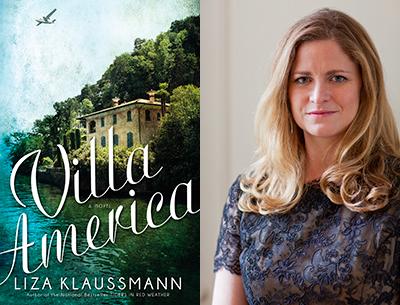License and Licentiousness

“Villa America”
Liza Klaussmann
Little, Brown, $26
“I liked it and I didn’t.” What better words to begin this review than Ernest Hemingway’s first words in his letter to F. Scott Fitzgerald after reading “Tender Is the Night,” Fitzgerald’s novel in which he muddled my grandparents Sara and Gerald Murphy with himself and Zelda.
“Goddamn it you took liberties with people’s pasts and futures that produced not people but damned marvelously faked case histories.” Ditto that, Papa!
“Villa America” is a historical novel about Sara and Gerald Murphy, spanning their lives from 1898 to 1937, mostly their childhoods, courtship, and years in the South of France. My grandmother is portrayed as a bored spinster, finally marrying Gerald at the age of 39. In fact, they met when they were teenagers in East Hampton, were pals for years, then fell in love, then married when she was 32. What was considered scandalous at the time was the fact that she was five years older than Grandpa.
What really sticks in my craw is the invention of an affair between my grandfather and a handsome pilot, a simple country boy who gets caught up in all those crazy Jazz Age shenanigans. Whiskey Tango Foxtrot! Was my grandfather gay or bisexual? Maybe, so what, who cares? He certainly was a dandy who loved costumes. But most important, he adored my grandmother deeply, and they had a wonderful life together in spite of enduring the tragic loss of both of their sons, a year apart, my uncles Baoth and Patrick.
The book is long, over 400 pages, and is meticulously researched. There is so much fact in it that the fictions become that much more jarring, especially to me, a living, breathing granddaughter who knew them well.
Which brings us to what defines a historical novel. Is it fair for me to think that “Wolf Hall” by Hilary Mantel and “The March” by E.L. Doctorow are fine examples of this genre but not this book? We know Henry VIII can’t speak up and say, “That ain’t true! I treated Catherine of Aragon fine until I laid eyes on that hottie Anne Boleyn.” Or Gen. William Tecumseh Sherman protest, “Dude, you really make me sound like a heartless bastard in your book!” Nobody is around from those eras to defend, correct, scoff, or sue.
One definition of historical novel says the subjects have to have been dead 50 years. Well, Liza Klaussmann hit the mark one year late for Gerald and is 10 years early for Sara. Was it necessary for her to create this Harlequin romance novel-esque gay affair of my grandfather’s to make the story better? Methinks not. This fictionalized retelling of their lives cheapens the extraordinariness of those lives. And there are so many other splendid and true books about the Murphys and their circle of friends that it just seems lazy and cheap. There is literary license, and there’s literary licentiousness.
Reading lines such as these coming from my grandmother just made me want to scream: “I am loved; I am lovable!” What is this, an episode of “Oprah” or a cheesy Lifetime movie? Sample this tasty morsel of Twinkie chunks: “Sara’s pulse flicked at her temple like a horse crop, and her palms began to sweat.”
I’ll spare you the bland sex scenes, which are dull but disconcerting nonetheless. No, actually I changed my mind, why should I be the only one to suffer through these? Now imagine, if you will, your grandmother being described thus: “Sara colored, thinking of herself lying back for Gerald, offering herself to him too quickly, so easily, like a bitch in heat.” Eeeew.
To quote Ernest Hemingway again, in his scolding letter to Scott about his portrayal of Sara and Gerald: “It’s a lot better than I say. But it’s not as good as you can do.” “Villa America” is an engaging beach read. The bumpkin-pilot Gerald-lover Owen Chambers’s adventures in the sky and the descriptions of his airplanes are nicely detailed. So, too, are the descriptions of day-to-day life for the Murphys while living in Antibes.
A review in The Guardian says Ms. Klaussmann “made up more than she needed to,” and The Washington Post snarked, “Do we really need to read more about Sara and Gerald Murphy?”
I’ll just end where I began, taking the words from Ernest Hemingway’s pen, written May 28, 1934, and sending them into the atmosphere to author Liza Klaussmann: “You cheated too much in this one. And you don’t need to.” Amen, Papa, I stole true words right out of your mouth.
